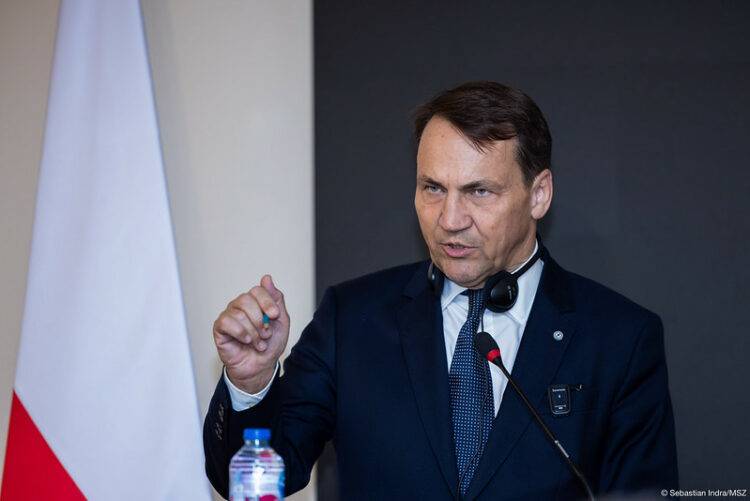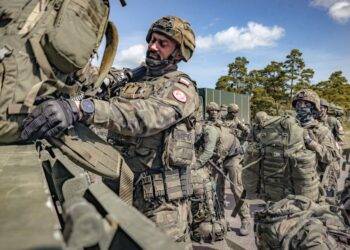In a defiant and historically charged speech before the Sejm (Polish parliament), Foreign Minister Radosław Sikorski delivered one of the most forceful condemnations of Russian imperialism by a Polish official in recent memory. Addressing lawmakers amid continued regional instability and an ongoing Russian war in Ukraine, Sikorski issued a direct message to the Kremlin: “You will never rule here again — not in Warsaw, not in Kyiv, not in Vilnius, not in Riga.”
The minister’s address, delivered as part of his annual foreign policy exposé, set a combative tone in Poland’s posture towards Moscow, reflecting growing concern among Polish leaders over Russian military ambitions and hybrid threats in Central and Eastern Europe. In framing Russia’s aggression as a neo-imperialist project, Sikorski made clear that Poland views itself not only as a front-line state in the defence of NATO’s eastern flank, but also as a guardian of the sovereignty of its neighbours.
A Message to Moscow: ‘Never Again’
Sikorski’s speech struck a deeply personal and historical chord. Recalling the centuries of foreign domination over Central and Eastern Europe, he spoke directly to the Russian government and its ideological supporters, declaring that no version of history — real or imagined — would ever justify a return to subjugation.
“You will never again rule here,” he said. “Not in Warsaw, not in Kyiv, not in Vilnius, not in Riga. That time is gone — forever.” The line, delivered with deliberate weight, was met with strong applause from members of the ruling coalition and parts of the opposition.
🇵🇱🇷🇺 "You will never rule here again, neither in Kyiv, nor in Vilnius, nor in Riga, nor in Tallinn, nor in Chisinau," –
— Poland 24 🇵🇱 (@poland24com) April 23, 2025
Polish Foreign Minister Radek Sikorski tells Putin. pic.twitter.com/UHrPM9ZWEK
The phrase echoed memories of the long shadow cast by Russian — and Soviet — rule over Poland and its neighbours, all of which spent decades under Moscow’s influence or occupation during the 20th century. Sikorski’s words were not merely rhetorical. They reflected a Polish foreign policy consensus that has emerged since Russia’s full-scale invasion of Ukraine in 2022: that Russia must be confronted decisively, diplomatically, militarily, and morally.
Critique of Russian Expansionism and Historical Narratives
In a broader critique of Russian ideology, Sikorski invoked the writings of Kremlin-linked political theorist Aleksandr Dugin, who has openly argued that an independent Poland has no place on the Eurasian continent. Dugin’s views, while extreme, have gained traction among segments of the Russian elite and are widely seen as providing an intellectual framework for the Kremlin’s imperial ambitions.
Sikorski dismissed such visions as delusional and dangerous. He noted that the earliest mention of Moscow in historical records comes from 1147 — as a provincial outpost of Kievan Rus — implying that Russia’s historical claims to other Slavic nations are both selective and ahistorical. “The fact of brutal conquest,” Sikorski argued, “does not establish ownership rights.”
This argument, he suggested, applies not only to Poland but to all nations formerly subjugated by Moscow. Sikorski made particular mention of Ukraine, Georgia, Moldova, Armenia and Belarus — countries whose sovereignty, he said, must be respected and safeguarded by the international community.
Emphasis on Unity Within the West
Sikorski warned that the greatest threat to regional security is not solely the military power of Russia, but disunity within the West. “For Poland, the greatest danger would be the disintegration of the Western alliance,” he said. “We must not let ourselves be divided. A fragmented response only emboldens the aggressor.”
He called for continued military and financial support for Ukraine, stating that the outcome of the war would shape the future of Europe’s security architecture. “A just peace, not a fragile ceasefire, must be our goal,” he said. “Only peace through strength will be respected in the Kremlin.”
The foreign minister’s call was aimed not only at domestic audiences but also at Poland’s partners in the European Union and NATO. He emphasized that wavering support for Ukraine — or fatigue with the conflict — would send the wrong signal to Moscow and risk encouraging further aggression.
Counting the Cost of War
Sikorski provided estimates of the human and economic cost of Russia’s war in Ukraine. He stated that the war had cost Russia at least $200 billion and led to nearly one million Russian casualties, including deaths and injuries. Despite these staggering losses, Russian forces currently control only about 20 percent of Ukrainian territory, he noted.
“These figures should give the Kremlin pause — but they have not. Which is why we must continue to stand firm,” he said.
He reiterated Poland’s position that Russia must bear legal and financial responsibility for war crimes and crimes against humanity committed during the invasion. “Justice must not be a theoretical concept,” he said. “There must be accountability — for Bucha, for Mariupol, for every town and village where atrocities were committed.”
Poland’s Role in European Security
Sikorski portrayed Poland as a pivotal player in the current European security landscape. He noted that Poland has provided substantial humanitarian and military aid to Ukraine, has hosted millions of Ukrainian refugees, and has modernized its own military at an unprecedented pace.
“Poland is not just a frontline state. It is a cornerstone of European stability,” he said. “Our actions show that we are not waiting for others to secure our freedom. We are leading.”
"Don't you have enough land? Eleven time zones and still not enough? Take care of better governing what is within your borders according to international law."
— Poland 24 🇵🇱 (@poland24com) April 23, 2025
– Polish Foreign Minister tells Russia. https://t.co/O1AXFYRLiY
The speech also served to reaffirm Poland’s commitment to multilateralism and international law. Sikorski expressed continued support for EU enlargement and for maintaining a strong transatlantic relationship with the United States. He also underscored the need for the EU to remain united on sanctions against Russia and to increase its strategic autonomy.
Domestic and Regional Implications
Sikorski’s speech comes at a time of intense domestic and geopolitical debate in Poland. With the presidential election approaching in May 2025, the government is seeking to project strength and continuity in foreign policy — particularly on issues of national security and sovereignty. The tone of Sikorski’s remarks is likely to resonate with a broad spectrum of the Polish public, which remains overwhelmingly supportive of Ukraine and wary of Russian intentions.
However, his speech also reflects a broader regional concern. Across Central and Eastern Europe, governments are increasingly vocal about the threat posed by Russian hybrid warfare, including disinformation campaigns, sabotage, and cyberattacks. Sikorski’s warning may therefore be seen as not only directed at Moscow, but also at Western allies — urging them not to underestimate the challenge ahead.
‘Never Again’ as National Doctrine
Sikorski’s final message — “Never again” — was not new, but it was powerfully reaffirmed. In postwar Polish political discourse, “never again” has traditionally referenced the devastation of the Second World War and Soviet domination. In this context, Sikorski’s use of the phrase was both a warning and a promise.
To Russia, it was a warning: Poland will never again submit to external control. To Poland’s allies, it was a promise: Warsaw remains committed to defending democracy, sovereignty, and European security — regardless of the cost.
As the war in Ukraine grinds on and the geopolitical stakes rise, Poland’s role in shaping the future of European security has become undeniable. With leaders like Sikorski setting a firm tone, Poland is sending an unmistakable message: the days of appeasement are over, and the defense of freedom in Eastern Europe is a mission that Poland is prepared to lead.


















